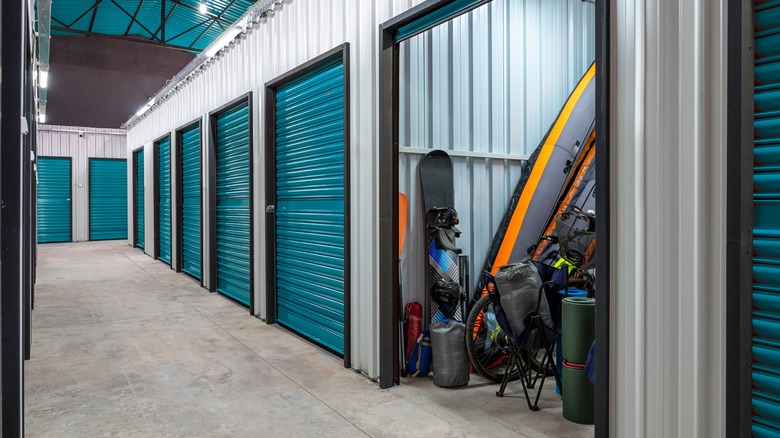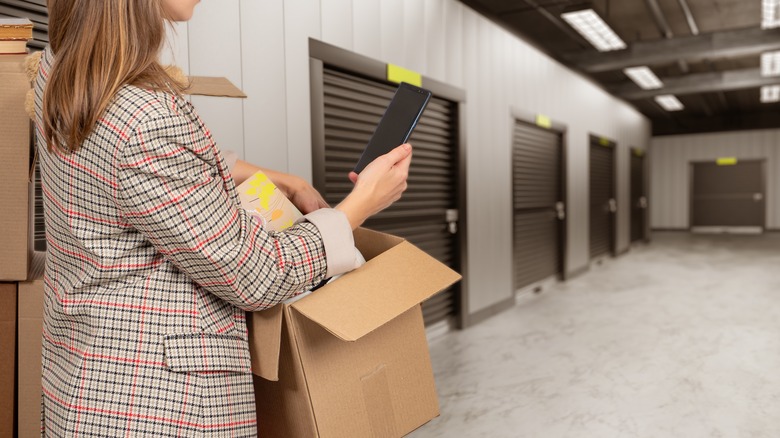Think Twice Before Renting A Storage Unit To House Your Items When Decluttering
Pop quiz: You have way too much stuff and not enough space to store it. What do you do? If you said "get a storage unit," better luck next round. Storage units may seem like a genius way to declutter your home in the moment, but in the long term, they can actually worsen your issue. You should think twice before using a storage unit when decluttering your home as it will likely cause more clutter, can be expensive, and could lead to damaged items.
If you have or want a storage unit, you're certainly not alone. There's no shortage of storage companies across the US, with many people turning to them specifically because they don't feel they have enough space in their homes. Yet many storage units are eventually abandoned and the items auctioned off ("Storage Wars," anyone?) — just one of many signs that storage units aren't as helpful for decluttering as one might hope.
One big obstacle to decluttering is when things get stuck in the halfway stage — like those bags that never make it to the donation center, or that furniture you're totally going to sell next week (really, you swear). In many cases, storage units are just another version of procrastinating the inevitable. Here are all the downsides to consider before you get a storage unit and the few situations where it might be worth it.
Storage units can lead to more clutter instead of less
It's true that storage units can help free up space in your home. But from a long-term decluttering perspective, they may be the exact last thing you need. "Out of sight, out of mind" applies here: by moving your extra belongings to a place where you don't have to see them every day, you delay the process of actually deciding what to do with all of it.
It's also too easy to accumulate more stuff after you've freed up space for it or end up buying duplicates of the items you already have in storage. You can also get sucked into keeping the storage unit (and the stuff in it) for longer than you initially planned. That takes a financial toll too; storage units are an extra monthly expense that can add up to thousands of dollars over the years.
And if you don't often go back to check on your things, you might have a nasty surprise waiting for you when it's finally time to go through the harrowing process of emptying an old, forgotten storage unit. Dust, mold, and pests are all potential issues, especially if your unit isn't climate-controlled.
What to do instead, and when storage units might be worth it
Rather than getting a storage unit, follow a professional organizer's simple storage rule of only keeping as much as you can neatly store in your home. To get to that point, there are many ways to go about downsizing, from the KonMari method to the 21-item toss method. Whichever tactic you use, the basic idea is the same: decide what to prioritize and prune the rest. Many people also appreciate the viral TikTok trend that takes a minimalist approach known as "underconsumption," or buying less stuff in the first place.
However, there are some scenarios where storage units may be worthwhile. For example, you might need somewhere to store your things during a short-term housing transition such as when moving, traveling, or renovating. Storage units can also allow you to keep larger items that you regularly use but don't have space to store at home such as holiday decorations or sporting equipment. The key is that you use the items often enough not to forget about them, that the cost makes sense, and that the storage unit isn't a replacement for decluttering.
If you choose to use a storage unit, keep it as organized as you would your actual home. Label bins so that you don't have to dig through the unit to find what you need, and stack items carefully. Consider taking photos so you know exactly what's in the unit without having to visit in person. Don't let too much time go by without visiting your unit, or you might fall victim to the "out of sight, out of mind" mentality.


